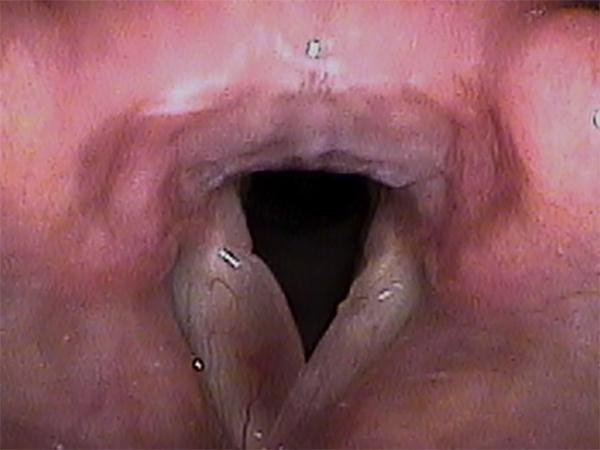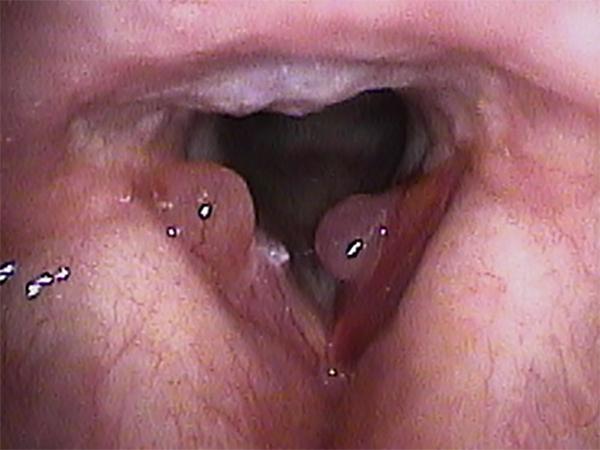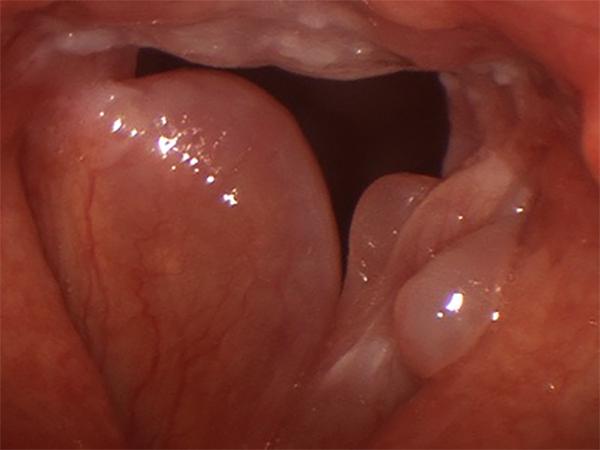Whether you see us in-person or by Video Visit, we're here for you. See how we're keeping you safe.
Reinke’s edema, also called “polypoid corditis”, is a swelling of the entire layer of the superficial lamina propria (or Reinke’s layer), a structure crucial to normal voice function. It occurs almost exclusively in smokers.

Reinke’s edema involves the left vocal fold above, making it appear very swollen.
Reinke’s edema is not itself a precancerous lesion, but it is a sign that the vocal cords have been exposed to a damaging degree of smoking. The entire surface of the mouth, as well as the nose, throat and neck, should be carefully examined in people with Reinke’s edema to make sure no cancer or precancerous lesions have been overlooked.

Reinke’s edema can be uneven and irregular, making it appear as if there are a number of separate masses. A hemorrhage of one vocal fold is also present above.
Reinke’s edema causes a very characteristic gravelly, low-pitched voice. This is the result of swelling of the superficial lamina propria, which becomes boggy and vibrates less well as it gains in mass. Because the voice is low-pitched, Reinke’s edema is most noticeable in women. Often, it can be overlooked in men with a naturally deep voice for the same reason.
Sometimes, the swelling of Reinke’s edema can become large enough to impair breathing. Initially, this occurs only during strenuous activity, but may ultimately affect breathing at rest and contribute to sleep apnea, a disorder of breathing during sleep.

Reinke’s edema may occasionally grow so large that it blocks breathing.
Vocal folds with Reinke’s edema look swollen along their entire length. The appearance has been likened to water balloons. The swelling of Reinke’s edema can be uneven, and may involve the two vocal folds unevenly. In fact, it may be entirely one-sided - as in the first two figures on this page. It is normal for the swelling to shift with breathing, and sometimes, the full extent of the swelling is visible only with a sharp intake of breath.
It is essential to recognize that Reinke’s edema is evidence of severe damage from smoking. The initial step in the treatment of Reinke’s edema is to quit smoking. Early or mild cases of Reinke’s edema may improve with smoking cessation alone. Continued smoking makes recurrence likely following treatment, sometimes in a matter of weeks. For that reason, many laryngologists prefer that a patient stop smoking prior to operating on Reinke’s edema.
If Reinke’s edema fails to improve sufficiently following smoking cessation, microlaryngoscopic surgery is the main treatment option. Surgery for Reinke’s edema has unique difficulties, because the superficial lamina propria must be reduced - but not excessively, in order to preserve vibration of the vocal fold. Excessive reduction produces scar and hoarseness that is very difficult to correct. The more surgeries that have to be done, the greater the risk of scarring - hence the importance of stopping smoking before treatment. Surgery can usually improve the voice substantially and eliminate any breathing difficulty.